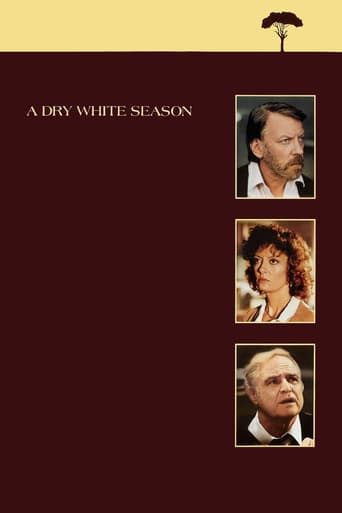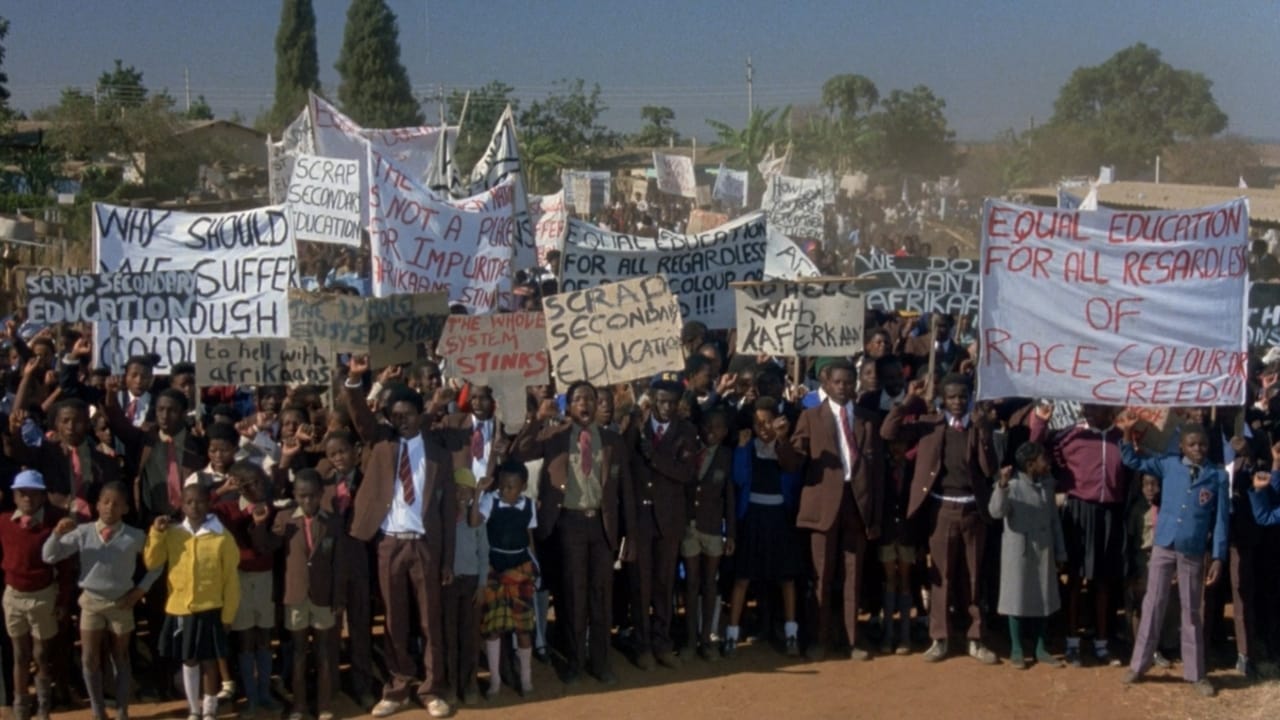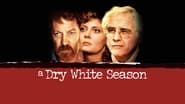MartinHafer
Donald Sutherland plays a well-respected white man living in apartheid-era South Africa. He is a famous ex-rugby player--with a happy life. But, when one of his servants comes to him to complain about police violence towards his son, slowly Sutherland is forced to confront the evil within his society. You see, this caning is only the beginning--soon far, far worse happens to these people and Sutherland refuses to look away and pretend it isn't happening. Eventually, Sutherland is so enraged by the police brutalities that he seeks legal advice--he wants justice and won't accept that there is different justice for blacks and whites. When the case comes to court, it soon becomes VERY apparent that it is futile. Despite overwhelming evidence showing how brutally the police murdered one of their detainees, it was ruled a suicide. With seemingly nothing he can do, what will he do next--especially when his own family just want him to drop it? It's funny, but there was a LOT of hubbub about Marlon Brando in the film. While he totally dominated the portion he was in, it was a relatively small role. I really had to feel sorry for Sutherland, as he was very good in the film but got almost no notice since Brando is an iconic figure and so much attention went towards him.As far as the film goes, it's excellent in every way--well acted, directed and written. It's a very compelling and sad film--and fortunately it's also about what is finally past. Well worth seeing.By the way, this is not a major complaint, but twice in the film if you look closely you can see supposedly dead people breathing. The first is a little girl who is shot and perhaps she really could have continued breathing for a few seconds. But, the guy inside the coffin is clearly supposed to be 100% dead but you can see his chest moving. These goofs should have been caught but don't really detract from the film.I am going to visit South Africa in a few weeks. As an American I naturally know very little about the place, but to get myself in the mood, I am watching as many films about the country as I can. Like most of these films, "A Dry White Season" is about South Africa during the apartheid era. I wish I knew of some other films (other than "Invictus") which talked more about South Africa as it is today.
mark.waltz
In "Mr. Smith Goes to Washington", James Stewart fought for a lost cause, the only cause he believed was worth fighting for. Fifty years after that iconic film moment, Donald Sutherland fought for another lost cause, risking everything he held dear in the process. This time, that cause is the eradication of injustice in South Africa after dozens of black children are murdered and their loved ones face annihilation for their grief-stricken protests.Sutherland plays the employer of one of the fathers of one of the victims, and when more murders occur (disguised as suicide), he finds himself involved in bringing the leaders of this outrage to justice. This causes friction between him and his scared wife (the lovely Janet Suzman, Academy Award Nominee for "Nicholas and Alexandra") who fears for the destruction of their safe family structure, safe mainly because they are white. A court trial (with Marlon Brando in an Oscar Nominated role as the attorney fighting this lost cause) results in more government corruption and Sutherland turns towards a sympathetic reporter (Susan Sarandon) to help him expose the cruelty of apartheid and bring the culprits (who are more like a government supported mafia) to justice.This is a disturbing topic, and moments of this film will bring on anger towards the hideous cruelties of the perpetrators. But it shows that even with the most corrupt government, there will always be people who will fight against it regardless of the dangers towards themselves. Sutherland is outstanding, and it is really nice to see Brando in a role bigger than a cameo. He may only be on for 20 minutes, but he is worthy of the acclaim he received. Susan Sarandon provides a nice cameo, probably because as a fighter of lost causes herself, she believed in the film's message. While I know little about the actual details of this corruption, I feel others like me may benefit by seeing the film to expose them to what is going on outside of their own back yard.
Michael Neumann
This 1989 anti-Apartheid drama makes a half-hearted attempt to include some perspective from the black minority in South Africa, but once again the story is slanted entirely toward its white protagonist (upper class, liberal schoolteacher Donald Sutherland) and equally white villain (sadistic secret police chief Jurgen Prochnow). The whole thrust of the plot is in fact set up so that the greatest outrage is reserved for Sutherland's all too predictable death at the end of the film, and not for all the incidental violence in Soweto. If the scenario showed any brains or integrity the limited point of view might have easily been excused (cf 'A World Apart'), but the urgent moral issues are instead reduced to hack melodrama, wasting the talent of several respected actors (who should have known better) in flimsy two-dimensional roles. Sutherland fakes a Boer accent, Susan Sarandon (on screen for all of five minutes) fakes a British accent, and in the end only Marlon Brando manages to transcend the banality of the script, in a small and otherwise unnecessary role as Sutherland's lawyer.
Robert J. Maxwell
The story of a schoolteacher (Southerland) who's black gardener's son "disappears" in 1970s South Africa, accused of activism. Then the gardner disappears too. Then an innocent black woman who is a friend disappears.With each incident, the comfortable family-oriented bourgois teacher becomes more involved in the awful injustices inflicted on black civilians, activists or just suspected activists. He first asks some friends in the government to help out and is treated with empty reassurances and pats on the back. Then he brings suit against the government's Special Action Squad (or whatever the death squad is called) for the gardener's death. The gardener was clearly tortured and then murdered under the supervision of the Chief Minister of Villainy (Jurgen Prochnow) and Southerland hires a lawyer who was disillusioned long ago (Marlon Brando).But Southerland pushes too far. His friends ignore him. He loses his job and his son is expelled from the school. His wife wants things the way they always have been -- nice compliant kaffirs who serve dinner when you tinkle the little bell, and sense of security. His wife leaves him, taking their adolescent daughter who feels the same way she does. Southerland's son, who seems to have inherited his Dad's ears, insists on staying with him and observes all the goings on. Susan Sarandon is a reporter who is sympathetic but has seen it all before. In the end, Southerland loses everything, but, as Sarandon tells him, despite his own helplessness, his son has learned a good deal and represents the next generation.The performances are all fine. Southerland is subdued and thoughtful in a role which calls for exactly those characteristics. Marlon Brando is also a standout, bringing to the part a kind of amused disdain for Southerland's naivete. Prochnow is properly villainous without being entirely unreasonable. He does his best with an Afrikaans accent -- nobody has ever trilled his r's so thoroughly -- but he may have been miscast because he looks like such a nice guy. I don't mean that the villain has to look like a scuzzbag, but that he should have an appearance and demeanor that projects villainy and what Prochnow projects is more like Carl Roger's "unconditional regard." But, beyond the incidents presented in this particular movie, I wonder what the function of such a story is. The first response of any sensitive viewer is undoubtedly going to be white guilt or black self pity. It's ironic because almost the entire population of viewers, regardless of race, color, or creed, will have had absolutely nothing to do with the events we see.Personally, we will be gripped by the exposition of such injustice -- such outright murder by the authorities -- and that's fine as far as it goes. Beyond that, the movie-makers have given us an educational documentary-style film, beginning with a naive complacent white guy, a lot like many of the rest of us, and guiding him through a tour of corrupt racism, along with the viewer. (How he could have remained so innocent without having lived in a cave isn't explained.) I wonder in the long run if movies like this (and "Z" and dozens of others) don't have counter-productive properties. We feel not only sympathy but anger. In the final shot -- and I do mean "shot" -- the movie seems to endorse the idea that violence is the only appropriate response to injustice. Why should such a notion be expected to do anything other than drive a deeper wedge between minorities and the dominant majority? Is murder really the only way out of inequity? If they kill us, is our only response to kill them too? A more object lesson might be that colonialism doesn't work for long, but a lot of viewers may not be able to get past the violence on screen. And anyway, colonialism never calls itself "colonialism." It's always "The Crusades," or "spreading civilization," or "protecting our own interests," or "preventing the spread of" (fill in the blank with your own noxious ideology).There's a semi-happy ending. Southerland's son will live to straighten things out. But it's a pale message and seems tacked on. Our amygdalas stand up and applaud at the end when Prochnow gets a bullet through his heart.Peace, brothers and sisters.



 AD
AD




